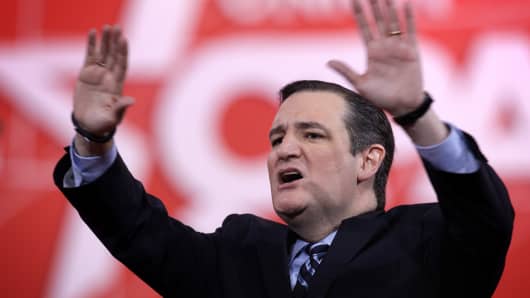The Republican presidential nominee will be either Donald Trump or Ted Cruz and regardless of who it is, he will lose to Hillary Clinton in November — badly. But if Trump is the nominee, his loss will only further empower Cruz and other obstinate members like him of the Grand Old Party — who wear their unwillingness to compromise as a badge of honor — to argue that they are the only answer to both the party's and America's problems.
Cruz's absolutist approach was most clearly on display through his repeated attempts to shut down the government in an effort to re-litigate policy debates that Democrats have (rightly or wrongly) already won. More problematically for the Republican Party, however, his inflexibility has begun to seep into the governing style of the party's leadership as well, which Democrats have capitalized upon to re-brand the GOP as the "party of no." One recent example is Senate Majority Leader Mitch McConnell's refusal to even consider Judge Merrick Garland's Supreme Court nomination — a decision from which vulnerable Republican Senate incumbents like Illinois' Mark Kirkhave been forced to distance themselves.
Somewhere along the way, Cruz and those who share his penchant for intransigence have hijacked the very meaning of what is it is to be "conservative" by re-defining it as a synonym for "unyielding," and they have lost sight of the fact that politics, by definition, is the art of compromise. Furthermore, leadership is not simply telling people what they want to hear nor is it outlasting those who disagree through the political version of trench warfare, in which any battles won are likely only Pyrrhic victories at best. Genuine leadership is the ability to convince others to buy into your vision.
If Trump is the nominee and gets trounced in November (which all the polling has clearly indicated he would), then Cruz and other Republicans who ascribe to his rigid mindset will simply dismiss Trump's rise and fall as an aberration that only reinforces the need for the next nominee to represent "true" conservative principles. And as modern history has shown, the runner-up for the GOP nomination in one election cycle often has a good chance of becoming the nominee in the next one in which there is not an incumbent GOP presidential candidate, as was the case with Ronald Reagan, George H. W. Bush, John McCain, and Mitt Romney.
But if Cruz is the nominee and loses decisively to Clinton, who many people on both sides of the aisle view as an otherwise highly vulnerable general election candidate in her own right, then it would significantly undermine the "my way or the highway" approach that currently appeals to a growing swath of Republicans, both among those who hold office and the party's base.
Despite Cruz's willingness to enter an alliance with John Kasich indicating a level of desperation on his part, he may still be able to wrest the nomination from Trump at the national convention in Cleveland this July. Nevertheless, that will not prevent Republicans from getting shellacked in November. And although many in the GOP establishment have belatedly and awkwardly embraced Cruz as the lesser of two evils to be their standard-bearer this year in hopes that he will cause less damage down-ballot in vulnerable Senate and House races, the rise and fall of Cruz could prove most useful to the Republican Party as the desperately needed catalyst to trigger introspection about its fundamental raison d'être.
There is certainly no guarantee that a clear defeat of Cruz by Clinton will lead to the immediate reboot that the GOP so gravely requires. After all, the last time Republicans faced such a defining moment as a result of a drubbing in a presidential contest was Barry Goldwater's monumental defeat to Lyndon Johnson in 1964, which, at least in part, laid the foundation for the tumultuous rise and fall of Richard Nixon. It was not until a decade and a half later that a true leader emerged again for the GOP and Republicans were able to enjoy the golden years of the Reagan administration.
Rather than simply pining for the glory of the bygone Reagan era though, the next generation of Republican leaders needs to forge its own modern vision of conservatism. They should start by following the example set by South Carolina Governor Nikki Haley, who in her response to President Obama's State of the Union Address this past January, eloquently asserted, "During anxious times, it can be tempting to follow the siren call of the angriest voices. We must resist that temptation." Indeed, whatever policy positions the 2020 Republican nominee adopts, they need to be premised on the principles of civility and inclusivity if he or she is going to truly "Make America (and the GOP) Great Again."
Commentary by Stephen A. Myrow, managing partner of Beacon Policy Advisors LLC, an independent policy research firm based in Washington, DC. He has served in various government roles, including as a senior Treasury Department official in 2008-2009. Follow him on Twitter @smyrow.
For more insight from CNBC contributors, follow @CNBCOpinion on Twitter.





